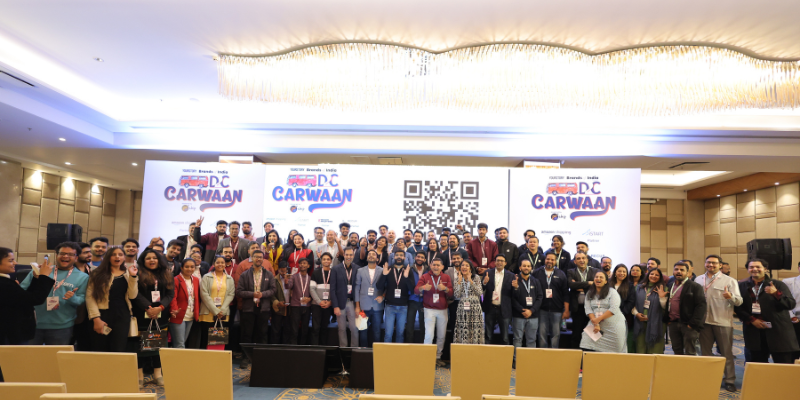[ad_1]
As India’s startup revolution extends beyond metropolitan hubs, Jaipur is emerging as a powerful force in the country’s entrepreneurial landscape. The Pink City, traditionally known for its royal heritage and artistic craftsmanship, is now making its mark as a thriving startup ecosystem. With its strategic location, cost-effective environment, and strong government support through initiatives like iStart Rajasthan, Jaipur is attracting founders who see the perfect blend of tradition and innovation.
It’s against this backdrop of transformation that YourStory hosted the latest edition of D2C Carwaan in Jaipur on December 13, bringing together over 140 unique brands and 94 founders to explore the intersection of traditional craftsmanship and digital commerce. The theme of this edition was ‘Crafting Jaipur’s D2C Leadership’.
Celebrating heritage through digital innovation
The event, organised in partnership with FShip, iStart, Amazon Shipping, Ecom Express transformed into a melting pot of ideas where heritage met innovation.
Adding to the logistics capabilities, Fship, leading tech-enabled shipping platform, is dedicated to providing advanced e-commerce solutions and streamlined logistics operations by leveraging technologies such as AI and automation.
Supporting the ecosystem building efforts, iStart, Rajasthan’s flagship programme launched in 2017, aims to support startups through incubation, mentorship, funding and by providing them work orders up to Rs. 25 lakhs without tendering process. It is among the largest startup programmes in India, available in every district of Rajasthan and open to startups from all states.
Among the key partners, Amazon Shipping offers last-mile delivery services covering 14,000+ pin codes with best in class promised delivery dates and pick up experience, helping businesses and D2C brands meet the growing need for reliable and cost-effective shipping in India.
Completing the logistics partnership ecosystem, Ecom Express Limited is a leading end-to-end technology enabled logistics solutions provider to the Indian retail and e-commerce industry. Using cutting-edge technology and automated solutions it enables end-to-end logistics and supply chain solutions across India serving 27,000+ pin codes throughout India.
Along with ecosystem partner Recur Club, these collaborators helped shape an evening that showcased how local entrepreneurs are revolutionising the direct-to-consumer landscape while staying true to their cultural roots.
“It’s an experience of its own kind as we have got aggregators, enablers, investors, vendors, sellers and also the various new age startups over here under one roof,” shared Deepika Agarwal, Founder of SilverMerc Designs, highlighting the event’s diverse ecosystem.
The event kicked off with an insightful fireside chat featuring Akhand Swaroop Pandit, Founder of Catalyst Group, who explored Jaipur’s transformation from the Pink City to a ‘click’ city. This was followed by an engaging session with photography entrepreneur Richa Maheshwari, who delved into the art of visual storytelling for D2C brands.
A significant highlight was Fship COO Mukuund Hari’s keynote address, where he shared the company’s remarkable journey of empowering over 100 D2C brands through simplified e-commerce and logistics solutions.
Charting the future of D2C
The event featured two dynamic panel discussions that brought practical insights to the forefront. The first panel, focusing on logistics and ecommerce solutions, saw participation from industry leaders including Shrawan Daga, Founder, Krishna’s Herbal & Ayurveda; Nitin Jain, Founder and CEO, Indigifts; and Raju Kumar Sinha, CBO, Fship. Their discussion focused on crucial strategies for optimising supply chains while preserving the authenticity of artisan-based products.
The closing panel, ‘Local Roots, National Wings’, featured stalwarts like Raghunandan Sarraf, Founder and CEO, INSARAF; Sushil Sharma, Founder and CEO, Marwari Catalysts Ventures; and Ankur Singhal, Vice President, Sales, Ecom Express; who shared valuable insights on scaling D2C brands while maintaining local authenticity.
Adding to the vibrancy of the evening were 13 carefully curated product showcases, ranging from pot jewellery to luxury backpacks for women’s and men’s fashion. These displays represented the diverse nature of Jaipur’s D2C ecosystem, with participating brands spanning categories like apparel, fashion, and home & living.
The event’s impact was perfectly captured by Neerja, Founder of Sutracar Creations, a second-time participant. “It has always been a wonderful experience. It’s a great platform to connect with like-minded people and there’s a lot to learn. I especially came because I wanted to incorporate technology into my brand and develop systems. I met so many people who had such wonderful ideas.”
With 160 attendees representing various segments of the D2C ecosystem, the event served as a vital networking platform for entrepreneurs, investors, and industry experts. The discussions highlighted how Jaipur’s D2C brands are successfully bridging the gap between traditional craftsmanship and modern consumer demands.
Want to stay updated about future D2C Carwaan events and be part of a growing community of D2C entrepreneurs? Join the YourStory D2C Community today to connect with fellow founders, access exclusive insights, and never miss an opportunity to grow your brand.
[ad_2]
Source link





